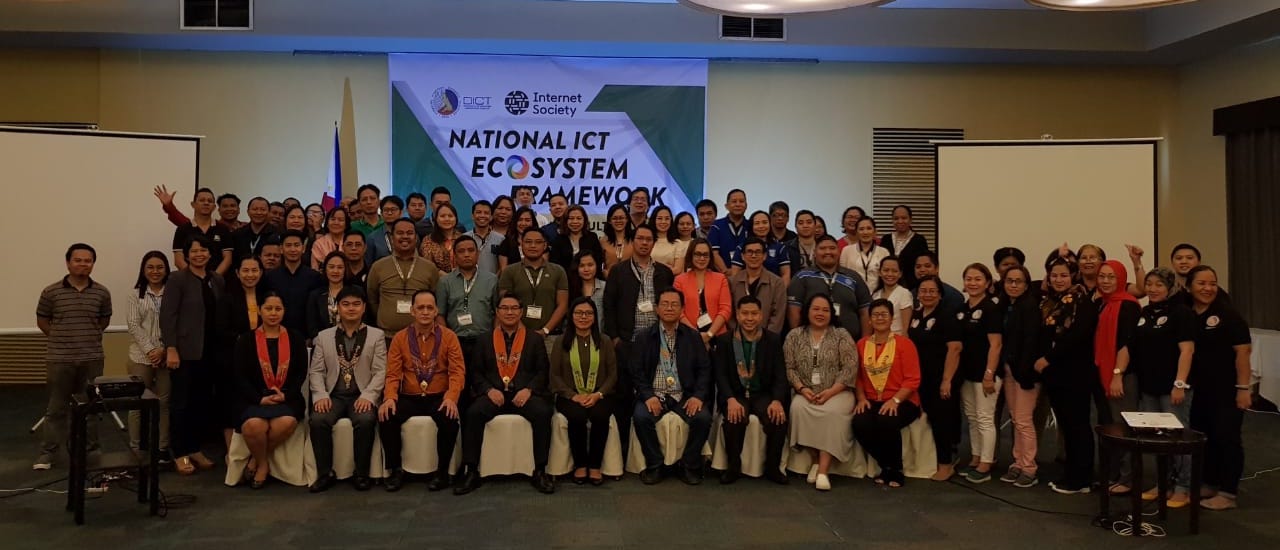In 2018, we began collaborating with the Philippines’ Department of Information and Communications Technology (DICT) to develop the country’s National ICT Ecosystem Framework (NICTEF), a successor to the Philippine Digital Strategy for 2011-2016.
The DICT, like all Philippine government agencies, is mandated by law to hold open consultations as a means of improving transparency and encouraging public involvement in the policymaking process. But it took this initiative further by ensuring that NICTEF is fully reflective of the needs and priorities of different sectors across the archipelago. For one year, the DICT led capacity building workshops, focus group discussions, writeshops, an online public survey, and regional consultations in each of the country’s major island groups, localizing the multistakeholder approach in the process to reach important and difficult decisions.
The NICTEF is now an authoritative guide on the Philippines’ digital ecosystem, and a roadmap to harmonize and coordinate the country’s ICT programs. The multistakeholder process adopted by NICTEF has been documented in a case study, offering other countries in the region a reference in developing public policies that are forward-thinking, inclusive, and suited to the needs of a steadily-interconnected world.
Below are some of our key takeaways from the process:
Develop and clearly present a value proposition to ensure that the multistakeholder process is productive and outcome driven.
In invitations and announcements, it is helpful to clearly specify to stakeholders why they should participate and what they would gain from their involvement in the policymaking process. This would help organizations identify appropriate representatives to take part in consultations and enable them to prepare their inputs.
Build strategic and sustainable partnerships for the implementation of a collaborative, multistakeholder model.
The multistakeholder model needs to be a continuous and sustainable process rather than a one-time initiative. For example, the DICT found it effective to initiate discussions with the policy and planning division of other government agencies. This division is most likely to be familiar with the overall direction, as well as the deliverables of each ministry, and would be able to provide guidance on possible collaboration and relevant divisions that may be tapped to contribute to the NICTEF.
Conduct face-to-face consultations at the regional level to hear from the countryside and harder-to-reach stakeholders.
Working with its regional and provincial offices, the DICT conducted public consultations across the country to reach out to each island group and accommodate different levels of development, priorities, and perspectives.
Tailor the multistakeholder process to the culture of the country.
In many Asian cultures, individuals tend to be reluctant to speak up when senior or governmental personnel are in the room. There is therefore a need to offer multiple ways for individuals to voice their concerns, even anonymously through surveys.
Focus on the entire ICT ecosystem, not just what the government or the ICT sector is doing.
A crucial part of ICT policymaking is identifying existing gaps in different sectors where policy interventions might be useful. To reach individual companies and organizations, DICT engaged with industry and professional bodies, such as the Philippine Chamber of Telecommunications Operators and the Information Technology and Business Process Association of the Philippines. Discussions and consultations were open to all and were announced online on government websites and social media sites.
Previous ICT policymaking exercises focused on governmental efforts in the ICT sector. NICTEF, however, is a national framework for the entire ecosystem of stakeholders to work collaboratively. It represents what the people of the Philippines collectively want for the country, and within this framework, the role that government can play.
Read A Multi-Stakeholder Model in ICT Policymaking: Case Study from the Philippines.

